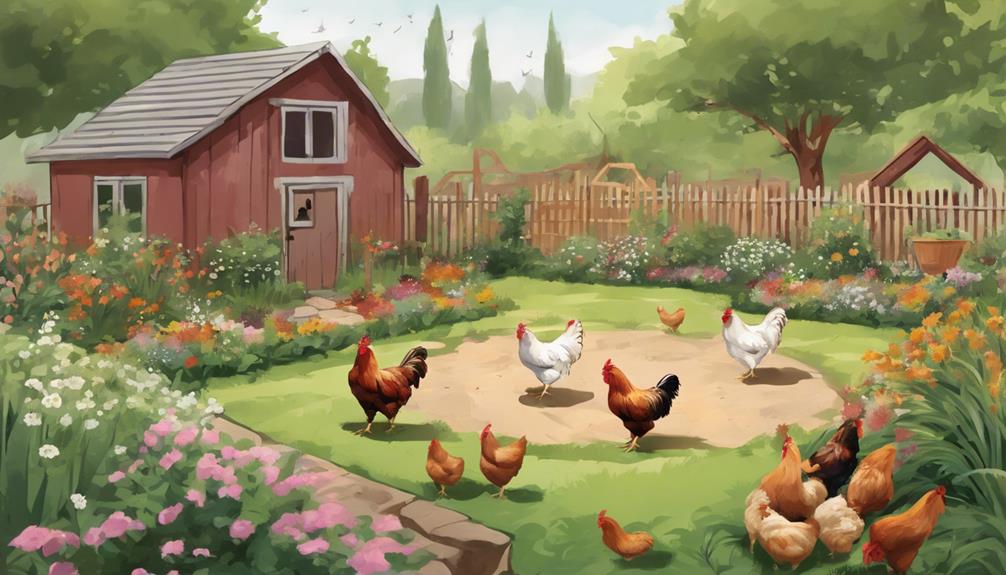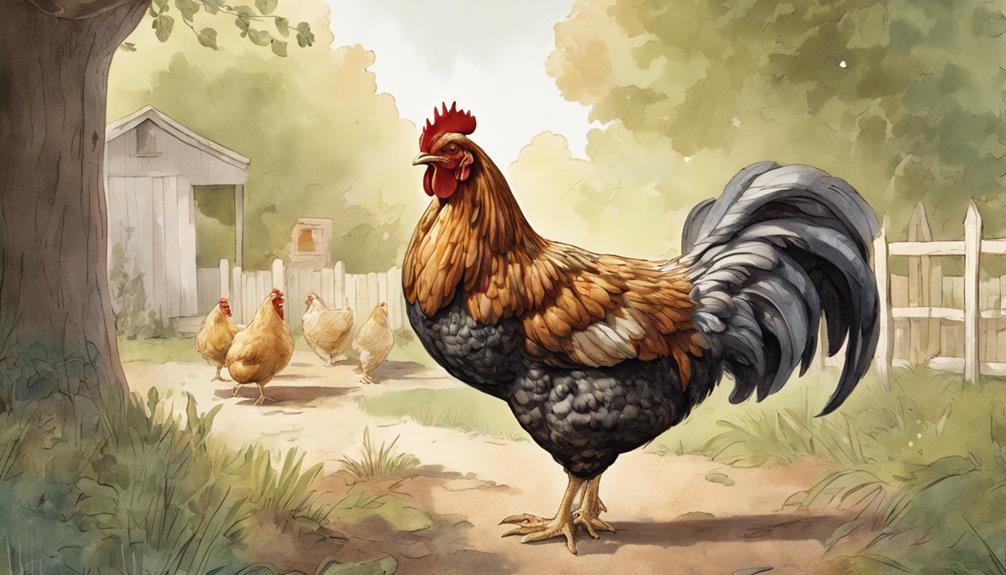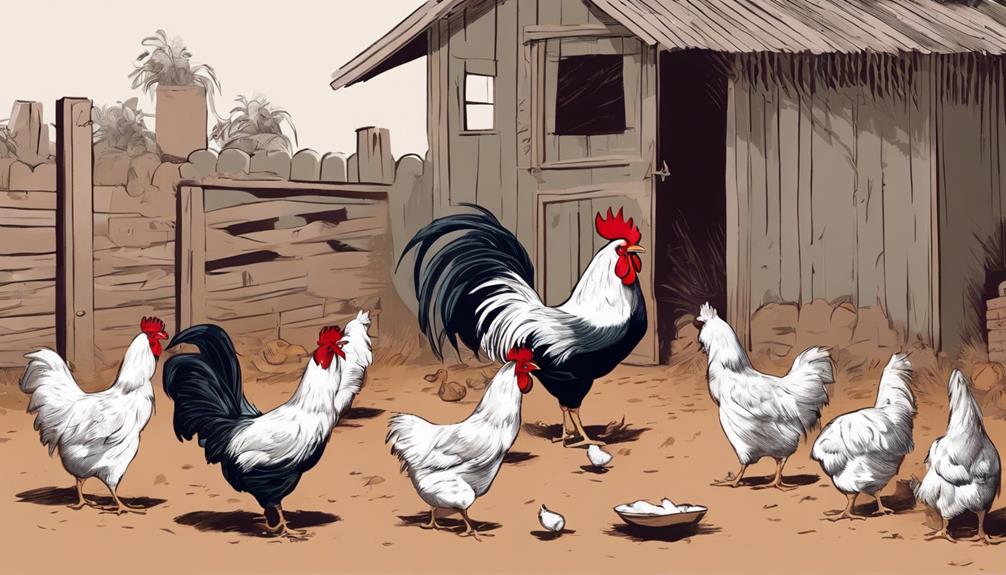You might not know this, but the color of the eggshell can indicate a lot about your chicken's health and why they're not laying as much as you'd hoped.
If you've noticed a decline in egg production, it's crucial to consider factors beyond the usual suspects like daylight and nutrition.
From the nuances of their social dynamics to the subtle signs of stress in the coop, there's a complex web of reasons that could be affecting your hens.
Unraveling these mysteries could lead you to not only improve their well-being but also see a significant uptick in those daily treasures.
Key Takeaways
- Insufficient daylight exposure below 14 hours can significantly reduce egg production.
- Improper nutrition, especially lack of calcium and high protein, hinders egg laying.
- Overcrowding and poor coop conditions stress chickens, affecting their egg production.
- Lack of regular health checks and vaccinations can lead to diseases that decrease egg laying.
Insufficient Daylight Exposure
Hens need at least 14 hours of light each day to lay eggs efficiently, but many backyard setups don't provide enough natural sunlight. If you've noticed a drop in your flock's egg production, it could be due to insufficient hours of daylight, especially during the shorter days of winter. When daylight dips below 12 hours, egg laying significantly declines. This is where artificial lighting comes into play.
By supplementing with artificial lighting, you can ensure your hens receive the 14-16 hours of light needed to stimulate egg production. It's not just any light that'll do the trick, though. Warm-white or yellow light sources are recommended for the coop. These types of lights mimic natural sunlight, helping to encourage laying without disrupting the hens' natural rhythms.
However, it's crucial to balance light exposure with rest. Hens require at least 6 hours of continuous darkness to rest and maintain proper biological function. Without this downtime, their health and egg-laying capabilities could suffer. So, while it's tempting to keep the lights on all the time to maximize egg output, remember that a well-rested hen is a productive hen.
Suboptimal Coop Conditions
While adjusting light conditions can significantly boost your flock's egg production, it's equally important to address the state of their living environment. A dirty coop not only becomes a haven for pests like flies and rodents, which stress your hens and drop egg production, but it's also a breeding ground for disease-causing microbes. This risk of infection can stop your chickens from laying eggs altogether.
Ammonia from accumulated droppings is another threat. It can damage the respiratory systems of your chickens, affecting their health and egg-laying capabilities. Ensuring the coop is regularly cleaned and well-ventilated will help mitigate this issue, keeping ammonia levels low and your chickens healthy.
Overcrowding can't be overlooked either. Too many hens in a limited space creates a stressful environment, inhibiting their natural behavior and egg production. Providing ample space for each hen to roam and nest comfortably is crucial.
Inadequate Nutrition

Just as humans need a balanced diet to thrive, your backyard chickens require proper nutrition to maintain high egg production rates. Inadequate nutrition, such as not enough energy, protein, or calcium, can lead to decreased egg production. It's essential to ensure your feathered friends get everything they need to stay healthy and lay regularly.
To boost your hens' egg-laying capabilities, focus on:
- Providing a complete layer feed that meets all their nutritional needs.
- Supplementing their diet with additional calcium, like oyster shell, for stronger eggshells.
- Ensuring continuous access to fresh water, vital for hydration and egg production, especially in colder months.
- Balancing their diet with essential nutrients, including adequate levels of protein and calcium, to support consistent and healthy egg production.
Molting Phases
After addressing your chickens' nutritional needs, it's crucial to understand the molting process, as this natural phase significantly impacts egg production. Typically, chickens start molting around 18 months of age and then annually, leading to a temporary decrease in egg production. Molting is when your chickens shed their old feathers to make way for new growth. During this time, they'll redirect their energy from laying eggs to feather regrowth.
You'll likely notice your hens stop or drastically reduce laying eggs until their molt is complete. This phase isn't brief; it usually spans 8 to 16 weeks, varying by individual bird. What can you do to help your chickens through this period? The answer lies in their diet. Providing high protein feed is key during molting. This supports quicker feather regrowth and can help your hens get back to laying eggs sooner rather than later.
Age-Related Issues

As your chickens grow older, you'll notice a decline in their egg production, typically starting after their second year. This natural aging process impacts how frequently your chickens lay eggs, reflecting the lifecycle of laying hens. Though they may start laying at around 4 to 6 months, reaching their peak in the first year, there's a notable shift as they age.
Here are key points to remember regarding age-related issues in egg production:
- Laying hens need extra care as they age, including adjusted nutrition to support their health despite decreased productivity.
- Chickens Stop Laying eggs regularly after their second year, with production gradually tapering off.
- Impact Egg production significantly drops as hens grow older, but they can still be valuable members of your flock.
- Despite reduced output, retired hens offer companionship and can contribute to the flock's social structure.
Understanding these changes helps set realistic expectations for your backyard flock's egg production over time. Remember, as your hens age, their needs change, but they still have plenty to offer beyond just eggs.
Egg Binding Complications
Understanding the natural aging process and its effect on egg production prepares us to address specific health issues like egg binding, a serious condition that can affect your hens. Egg binding occurs when an egg gets stuck inside a hen's reproductive tract, a situation that demands your immediate attention. Factors contributing to egg binding include calcium deficiency, which is often due to an imbalanced diet, as well as genetics and stress.
When your hen is egg-bound, you'll notice symptoms such as lethargy, straining, or a swollen abdomen. These signs indicate that your hen is struggling and requires help. An imbalanced diet lacking sufficient calcium can exacerbate this condition, highlighting the importance of ensuring your hens receive all necessary nutrients.
To address egg binding, providing extra calcium can be a first step. Warm baths may also offer relief for your hen, helping relax her muscles and potentially easing the egg out. However, if these methods don't resolve the issue, seeking veterinary assistance is crucial. Egg binding isn't just uncomfortable for your hen; it's a life-threatening emergency that can lead to complications or even death if not promptly treated.
Stress and Social Dynamics

Stress within the flock, often caused by aggressive behavior or changes in the pecking order, can significantly decrease egg production. When chickens feel threatened or unsettled, their bodies prioritize survival over laying eggs. It's essential you're aware of the dynamics within your coop to ensure your hens are happy and productive.
Here are key factors to watch out for:
- Aggressive Hens or Bullying: Dominant chickens can cause stress to others by bullying, leading to a decrease in egg production.
- Changes in the Pecking Order: Introducing new chickens or any shake-up in the pecking order can disrupt the social balance, affecting egg laying.
- Overcrowding: Too many chickens in a small space can lead to social stress and competition for resources, negatively impacting egg production.
- Predators: The presence of predators near the coop can cause continuous stress, making chickens too anxious to lay eggs.
Creating a calm environment with enough space and minimal disruptions can help ease stress and improve egg production. Keep an eye on the social dynamics and make adjustments as needed to keep your chickens comfortable and productive.
Conclusion
In conclusion, if your backyard chickens aren't laying as many eggs as you'd hoped, it's likely due to several factors such as insufficient daylight, poor coop conditions, inadequate nutrition, molting, age, egg binding issues, or stress from social dynamics. By addressing these factors, you can improve their egg production significantly.
Ensure they get enough light, provide a stress-free environment, offer balanced meals, and be mindful of their health and social needs to see a positive change in their laying habits.